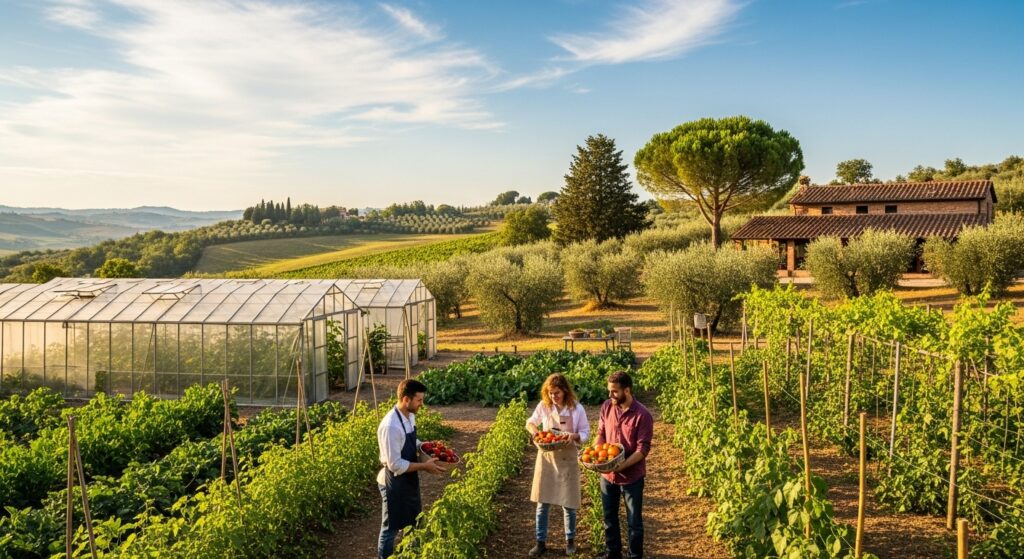Horti-culture vacations represent a transformative shift in travel, merging horticulture, agriculture, and tourism into immersive experiences that educate, inspire, and rejuvenate. These journeys cater to garden enthusiasts, eco-conscious travelers, and cultural explorers seeking authenticity beyond conventional tourism. With agritourism revenue tripling between 2002 and 2017 and botanical gardens witnessing a 20% surge in visitors post-pandemic, this niche market is redefining sustainable travel . This guide delves into the essence of horti-culture vacations, their benefits, planning strategies, and global hotspots, offering a blueprint for your next meaningful adventure.
What Are Horti-Culture Vacations?
Horti-culture vacations are specialized travel experiences centered around gardens, farms, and agricultural landscapes. They encompass:
- Botanical Tourism: Visits to curated gardens, arboreta, and conservatories for education and aesthetic enjoyment.
- Agritourism: Engagement with working farms through activities like harvesting, cheese-making, or wine tasting.
These trips prioritize hands-on learning, cultural exchange, and environmental stewardship, appealing to travelers seeking depth and purpose.

Botanical Tourism vs. Agritourism: Key Differences
| Aspect | Botanical Tourism | Agritourism |
|---|---|---|
| Focus | Plant collections, design, conservation | Farming practices, food production, rural life |
| Activities | Garden tours, workshops, photography | Fruit picking, animal feeding, cooking classes |
| Settings | Public gardens, conservatories, historical estates | Working farms, vineyards, ranches |
| Primary Appeal | Aesthetic beauty, educational programs | Hands-on experiences, culinary immersion |
Why Horti-Culture Vacations Are Gaining Popularity?
A. Sustainable Travel Demand
- Eco-Consciousness: 68% of travelers prefer sustainable options, with agritourism reducing carbon footprints by supporting local food systems.
- Preservation Efforts: Botanical gardens conserve 60% of temperate plant species, combating biodiversity loss.
B. Wellness and Mental Health Benefits
- Nature Therapy: Studies show that spending time in gardens lowers blood pressure and reduces stress.
- Therapeutic Horticulture: Structured programs improve mental clarity and emotional well-being through activities like gardening and forest bathing.
C. Cultural and Educational Value
- Local Immersion: Travelers connect with traditions, such as Tuscan olive harvesting or Japanese bonsai cultivation.
- Skill Development: Workshops on composting, botanical art, or organic farming offer practical knowledge.
D. Economic Impact
- Rural Revitalization: Agritourism generates $950 million annually in the U.S., creating jobs and diversifying farm income.
- Support for Small Farms: 70% of agritourism operators are small-scale farmers, bolstering local economies.

Top Horti-Culture Vacation Experiences
A. Botanical Gardens and Arboreta
- Royal Botanical Gardens (Ontario): Features sustainable rose gardens and eco-friendly practices.
- Christchurch Botanic Gardens: Offers guided strolls, wildlife viewing, and conservatory tours.
- Montreal Japanese Garden: Combines cultural themes with horticultural displays.
B. Agritourism Destinations
- Tenuta di Spannocchia (Tuscany): A historic estate offering farm stays, organic cooking classes, and vineyard tours.
- La Ferme Tarenti (Tunisia): Provides cheese-making workshops and super-organic farm tours.
- Jardin d’Agaves (Tunisia): Integrates Mexican-inspired cuisine with Tunisian ingredients in a garden setting.
C. Therapeutic Horticulture Tours
- Structured Retreats: Group tours like those by Therapeutic Garden Tours include masterclasses and behind-the-scenes access to healing gardens.
- Benefits: Foster professional networking, personal renewal, and community belonging.
How to Plan a Horti-Culture Vacation?
Step 1: Choose Your Focus
- Interest-Based Selection: Opt for botanical tourism if you prefer curated beauty or agritourism for hands-on activities.
- Seasonal Timing: Visit during harvest seasons (e.g., autumn for vineyards) or spring for botanical garden blooms.
Step 2: Research Destinations
- Global Hotspots:
- Italy: Tuscany’s agritourism farms and villa gardens.
- New Zealand: Garden tours featuring native flora and open gardens.
- California: Wine regions and sustainable farms.
- Local Gems: Use resources like the American Horticultural Society’s garden network.
Step 3: Book Authentic Experiences
- Direct Booking: Schedule through farm websites or platforms like Solimar International for curated agritourism.
- Workshops: Enroll in classes on botanical painting, composting, or farm-to-table cooking.
Step 4: Prepare for Your Trip
- Packing Essentials: Include sturdy footwear, gardening gloves, and reusable water bottles.
- Health Considerations: Verify insurance coverage for rural areas and physical activities.

Cost and Budgeting Tips
- Average Costs:
- Budget: $50–$100/day for self-guided tours and farm stays.
- Luxury: $200–$500/day for all-inclusive retreats (e.g., Six Senses agritourism programs).
- Saving Strategies:
- Travel offseason for discounts.
- Volunteer through programs like WWOOF for free accommodation.
Challenges and Solutions
- Accessibility: Some farms lack public transport. Solution: Rent a car or join group tours .
- Language Barriers: Rural areas may have limited English. Solution: Use translation apps or hire local guides.
- Weather Dependence: Outdoor activities are climate-sensitive. Solution: Have indoor alternatives like cooking classes.
Future Trends in Horti-Culture Travel
- Technology Integration: Virtual garden tours and apps for plant identification.
- Climate Resilience: Gardens and farms adopting drought-resistant crops and regenerative practices.
- Luxury Agritourism: High-end experiences blending wellness, gastronomy, and sustainability.
Frequently Asked Questions (FAQs)
Q1: Are horti-culture vacations suitable for children?
Yes! Farms offer petting zoos and picking activities, while botanical gardens have interactive trails.
Q2: How do I find ethical agritourism operators?
Choose farms certified by bodies like the Global Agritourism Network or with organic credentials.
Q3: Can I participate if I have limited mobility?
Many botanical gardens have paved paths, and farms offer seated workshops.
Q4: What’s the best time to visit botanical gardens?
Spring and autumn for blooms, but conservatories are year-round.
Q5: How can I extend the experience at home?
Join online communities like the American Horticultural Society for continued learning.
Cultivate Your Next Adventure
Horti-culture vacations offer more than a getaway—they foster connections to nature, culture, and community. Whether wandering through a historic botanical garden, harvesting olives in Tuscany, or joining a therapeutic retreat, these experiences enrich the mind, body, and planet. As the world embraces sustainable travel, horti-culture vacations stand out as a path to discovery and renewal. Start planning your journey today, and transform your travel into a force for good.
Explore Further:
- American Horticultural Society for garden networks.
- Solimar International for agritourism guides.
- Global Agritourism Network for certified farms.
